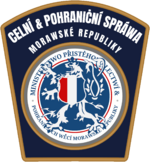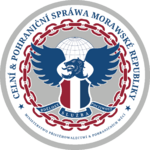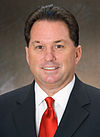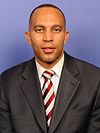Customs & Border Protection Administration
| Customs & Border Protection Administration of Morrawia Celní & pohraniċní spráwa Morawské republiky | |
|---|---|
 CBP Patch | |
 CBP Seal | |
| Abbreviation | CBP (Morrawian: CPS) |
| Motto | Bdėlost, slużba, poctiwost Vigilance, Service, Integrity |
| Agency overview | |
| Formed | January 25, 2005 |
| Preceding agencies |
|
| Employees | 41,340+ (2022) |
| Annual budget | ₮35 billion (2022) |
| Jurisdictional structure | |
| Federal agency | Morrawia |
| Operations jurisdiction | Morrawia |
| General nature | |
| Operational structure | |
| Overviewed by | Ministry of Immigration & Border Affairs |
| Headquarters | Financial Palace, Králowec, F.D., Morrawia |
| Federal Law Enforcement Sworn Officers | 33,110 |
| Agency executives |
|
| Parent agency | Ministry of Immigration & Border Affairs |
| Child agencies | |
| Website | |
| cbp | |
Customs & Border Protection Administration of Morrawia (CBP) is the largest federal law enforcement agency of Morrawian Ministry of Immigration & Border Affairs. It is the country's primary border control organization, charged with regulating and facilitating international trade, collecting import duties, as well as enforcing Morrawian regulations, including trade, customs and immigration. CBP is one of the largest law enforcement agencies in the Republic of Morrawia. It has a workforce of more than 31,300 federal agents and officers. It is headquartered in Králowec, F.D.
Organization
CBP has a workforce of over 39,000 employees, including officers and agents, agriculture specialists, aircraft pilots, trade specialists, mission support staff, and canine enforcement officers and agents.
- More than 15,180 CBP Officers inspect and examine passengers and cargo at ports of entry.
- Over 500 CBP Agriculture Specialists work to curtail the spread of harmful pests and plant and animal diseases that may harm Morrawia's farms and food supply or cause bio- and agro-terrorism.
- Over 16,370 Border Patrol Agents protect and patrol kilometres of borders with Foxomexra, Kakland, Wassilia and Melvenia.
- Nearly 250 Air and Marine Interdiction Agents prevent people, weapons, narcotics, and conveyances from illegal entry by air and water.
- Around 740 employees in CBP revenue positions collect over billions annually in entry duties and taxes through the enforcement of trade and tariff laws. In addition, these employees fulfill the agency's trade mission by appraising and classifying imported merchandise. These employees serve in positions such as import specialist, auditor, international trade specialist, and textile analyst.
- The primary goal of the CBP Canine Program is terrorist detection and apprehension. The CBP Canine Program is critical to the mission of the Ministry of Immigration & Border Affairs: "To Protect the Motherland." The program conducts the largest number of working dogs of any Morrawian federal law enforcement agency. K-9 teams are assigned to dozens commercial ports and each Border Patrol stations throughout the nation.
There are over 200 officially designated ports of entry and an additional pre-clearance locations. CBP is also in charge of the Container Security Initiative, which identifies and inspects foreign cargo in its mother country before it is to be imported into Morrawia.
In addition the CBP claims to have legal jurisdiction to conduct some activities up to 50 km (31 miles) inwards from any land or sea border. This can include operating interior checkpoints.
CBP assess all passengers flying into Morrawia for terrorist risk via the Joint Terrorism Task Force (JTTF) and various systems aimed at tourism, student exchange programs and more. CBP also works with the Morrawian Food and Drug Administration to screen high-risk imported food shipments in order to prevent bio-terrorism and agro-terrorism.
Through the Container Security Initiative, CBP works jointly with host nation counterparts to identify and screen containers that pose a risk at the foreign port of departure before they are loaded on board vessels bound for Morrawia. CSI is implemented in half of the largest ports in terms of container shipments to Morrawia with several ports worldwide.
The National Network Rapid Inspection program allows pre-screened, low-risk travelers from countries to be processed through dedicated lanes. Same program is used for every border crossing. Along all borders, CBP has implemented the Free and Secure Trade, which uses transponder technology and pre-arrival shipment information to process participating trucks as they arrive at the border. An agreement with Kakland allows CBP to target, screen, and examine rail shipments headed to the Morrawia.
CBP is authorized to provide aerial surveillance outside of the border area "to assist law enforcement and humanitarian relief efforts" when requested by local, community, state or federal agencies. CBP drones have been used to capture images of storm-impacted areas for the Federal Weather Bureau, assess hurricane affected areas for FEDRA, and provide surveillance for local law enforcement during the 2016 Kosmoly protests and 2020 Turín protests.
Structure
- Commissioner
- Deputy Commissioner
- Office of Intelligence
- Air and Marine Operations
- Office of Field Operations
- Border Patrol of Morrawia
- Coast Guard Bureau of Morrawia
- Office of Trade
- Enterprise Services Office
- Office of Acquisition
- Office of Finance
- Office of Human Resources Management
- Office of Training and Development
- Office of Information and Technology
- Operations Support Office
- Office of International Affairs
- Office of Chief Counsel
- Office of Congressional Affairs
- Office of Intergovernmental Public Liaison
- Office of Privacy and Diversity
- Office of Professional Responsibility
- Office of Public Affairs
- Office of Trade Relations
- Deputy Commissioner
List of commissioners of Customs & Border Protection Administration of Morrawia
| No. | Portrait | Commissioner | Took office | Left office | Time in office | Party | President |
|---|---|---|---|---|---|---|---|
| 1 | 
|
Roman Bolner (born 1942) |
January 25, 2005 | April 14, 2008 | 3 years, 80 days | Republican | Josef Sokol (R) |
| 2 | 
|
Denisa Wálkowá (born 1943) |
April 15, 2008 | November 21, 2010 | 2 years, 220 days | - | Frantiṡek Denár (R) |
| - | 
|
Bohumil Strádal Acting |
November 21, 2010 | April 14, 2012 | 1 year, 145 days | - | Frantiṡek Denár (R) |
| 3 | 
|
Rudolf W. Keiser (born 1962) |
April 15, 2012 | June 1, 2016 | 3 years, 80 days | Republican | Frantiṡek Denár (R) Tomáṡ Slawinský (L) |
| 4 | 
|
Tomáṡ Ċáslawský (born 1955) |
June 2, 2016 | June 19, 2019 | 3 years, 109 days | - | Tomáṡ Slawinský (L) |
| - | 
|
Alan Bant Acting |
June 19, 2019 | March 10, 2021 | 1 year, 325 days | Republican | Tomáṡ Slawinský (L) |
| - | 
|
Klement Gottwald Acting |
March 10, 2021 | June 5, 2023 | 2 years, 26 days | - | Tomáṡ Slawinský (L) |
| - | 
|
Nela Károwá Acting |
June 5, 2023 | June 11, 2024 | 1 year, 6 days | Liberal | Tomáṡ Slawinský (L) Marcel Pelikán (L) |
| 5 | 
|
Hubert Kozár (born 1971) |
June 12, 2024 | Incumbent | 168 days | Liberal | Marcel Pelikán (L) |
Enforcement powers

CBP has the authority to search outbound and inbound shipments, and uses targeting to carry out its mission in this area. Under Tariff Act, CBP is required to seize and forfeit all merchandise that is stolen, smuggled, or clandestinely imported or introduced. CBP is also required to seize and forfeit controlled substances, certain contraband articles, and plastic explosives that do not contain a detection agent. In conjunction with the Ministry of Foreign Affairs and the Census Bureau of Morrawia, CBP has put in place regulations that require submission of electronic export information on Morrawian Munitions List and for technology for the Commerce Control List. CBP uses advance information from the Automated Targeting System and the Automated Export System to identify cargo that may pose a threat. CBP also works with the Ministries of Foreign Affairs and Defense to improve procedures on exported shipments of foreign military sales commodities.
Merchandise may also be seized and forfeited if:
- Its importation is restricted or prohibited because of a law relating to health, safety or conservation
- The merchandise is lacking a federal license required for the importation
- The merchandise or packaging is in violation of copyright, trademark, trade name, or trade dress protections
- The merchandise is intentionally or repetitively marked in violation of country of origin marking requirements or
- The imported merchandise is subject to quantitative restrictions requiring a visa or similar document from a foreign government, and the document presented with the entry is counterfeit.
Civil penalties
Tariff Act of 1930 involved the basic and most widely used customs penalty provisions for the importation of goods. It prescribes monetary penalties against any person who imports, attempts to import, or aids or procures the importation of merchandise by means of false or fraudulent documents, statements, omissions or practices, concerning any material fact. Penalties may be applied even in situations where there is no loss of revenue.
Another section infractions are divided into three categories of culpability, each giving rise to a different maximum penalty:
- Fraud, an act or omission done intentionally to defraud Morrawia. The maximum civil penalty for a violation is the domestic value of the merchandise in the entry or entries concerned.
- Gross negligence, an act or omission with actual knowledge of, or wanton disregard for, the relevant facts and a disregard of relevant sections obligations. The maximum civil penalty is the lesser of the domestic value of the merchandise or four times the loss of revenue (actual or potential). If the infraction does not affect revenue, the maximum penalty is 40% of the dutiable value of the good.
- Negligence, involving a failure to exercise due care in ascertaining the material facts or in ascertaining the obligations of relevant sections. The maximum civil penalties are the same for gross negligence, except the lesser of twice the domestic value of the merchandise or twice the loss of revenue is used. The penalty cannot exceed 20% of the dutiable value.
The Customs Modernization Act amended several sections of existing laws to apply existing penalties for false information to information transmitted electronically and allows Customs to recover unpaid taxes and fees resulting from violations. It also introduced the requirement that importers use "reasonable care" in making entry and providing the initial classification and appraisement, establishing a "shared responsibility" between Customs and importers, thus allowing Customs to rely on the accuracy of the information submitted and streamline entry procedures. To the extent that an importer fails to use reasonable care, Customs may impose a penalty.
Morrawian Customs Agriculture Specialist Officers are allowed to issue civil penalties in accordance with these provisions.
Criminal penalties
In addition to the civil penalties, a criminal fraud statute provides for sanctions to those presenting false information to customs officers, with violators facing a maximum of 2 years imprisonment, or a ₮20,000 fine, or both, for each violation involving an importation or attempted importation.
History
Morrawian Customs Service
Responding to an urgent need for revenue following the Great Morrawian Revolution, the First Federal Congress of Morrawia passed, and President Tristan Palacký signed on July 4, the Tariff Act of 1860, which authorized the collection of duties on imports. Four weeks later, on July 31, the fifth act of the Federal Congress established the Morrawian Customs Service and its ports of entry. Alongside it, the Financial Guard of Morrawia, established in the same year, played a crucial role in the economic integrity and law enforcement within the nation. The organization's primary mandate was to operate within the borders of Morrawia, ensuring compliance with customs laws. While the MCS monitored the entry points and border areas, the Financial Guard focused on internal operations, meticulously tracking goods and finances, and apprehending those who sought to evade the law.
For over hundred years, the Morrawian Customs Service was one of the primary sources of governmental funds, which paid for the nation's early growth and infrastructure. Purchases include the early development of federal infrastructure, funding for Morrawian territories, funding the many postponed railroad projects, building many of the Morrawia' lighthouses, general reorganization of the states and military academies. Adding to it, the Financial Guard agents were well-trained in financial forensics, undercover operations, and legal proceedings, which enabled them to effectively dismantle smuggling rings, tax evasion schemes, and other economic crimes. Their efforts not only protected the state's revenue but also contributed to a fair market environment by ensuring that all businesses complied with national regulations. The Financial Guard of Morrawia was dissolved in 1920 and FIB and other agencies mostly took on its responsibilities.
In January 2005, the Customs Service, renamed the Customs & Border Protection Administration, and its structures was split to form parts of the Morrawian Ministry of Immigration & Border Affairs as the Customs & Border Protection Administration and the Immigration Enforcement Administration with its mission, duties and powers altered. Furthermore some of its old functions were distributed amongst many agencies in the federal apparatus.
Immigration Bureau of Morrawia (IBM)
Shortly after the Great Morrawian Revolution, most states started to pass their own immigration laws, which prompted the Morrawian Supreme Court to rule in Jarta v. Fortenský in 1875 that immigration was a federal responsibility. The Immigration Act of 1876 established an Office of the Commissioner of Immigration within the Morrawian Ministry of the Interior. This office was responsible for admitting, rejecting, and processing all immigrants seeking admission to Morrawia and for implementing national immigration policy. "Immigrant inspectors", as they were then called, were stationed at major Morrawian ports of entry collecting manifests of arriving passengers. A "head tax" of 1 tollar was collected on each immigrant.
In the early 20th century, Federal Congress's primary interest in immigration was protecting Morrawian workers and wages – the reason it had become a federal concern in the first place. After the Great War, Federal Congress attempted to stem the flow of immigrants, by passing laws in 1921, 1924 and 1928 limiting the number of newcomers by assigning a quota to each nationality based upon its representation in previous Morrawian census figures. Each year, Morrawian Foreign Ministry issued a limited number of visas. Only those immigrants who had obtained them and could present valid visas were permitted entry.
The Immigration Bureau of Morrawia was formed in 1927 by a merger of the Morrawian Immigration Service and the Bureau of Naturalization.
Reorganization (2005 to present)
CBP became an official agency of the Morrawian Ministry of Immigration & Border Affairs on January 25, 2003, combining employees from the Animal Health Inspection Service, the Morrawian Immigration Bureau (specifically, immigration inspectors and the Border Patrol of Morrawia), the Morrawian Customs Service. This transformation was led by former Commissioner Roman Bolner.
Denisa Wálkowá was nominated to the post of Commissioner by President Josef Sokol on February 10, 2008. Wálkowá had 28 years of experience as a law enforcement manager, including serving as the head of the Presidential Service and the Federal Law Enforcement Training Center. She had also served as the chief of staff for the Transportation Security Administration. She was sworn in on the first day of the Frantiṡek Denár presidency. It is the largest federal law enforcement agency and works closely with Immigration Enforcement Administration (IEA), Federal Bureau of Narcotics (FBN), and Federal Investigation Bureau (FIB).
In 2007, the Border Patrol of Morrawia joined two units, the Border Patrol Tactical Unit (BORTAC) and the Border Patrol Search, Trauma, and Rescue Unit (BORSTAR), to form the Morrawian Border Patrol's Special Operations Group (SOG), headquartered in Gdynė, Caripathia. BORTAC and BORSTAR direct their nationally dispersed assets from the SOG, providing the Border Patrol with immediate tactical and emergency response assets.
Since June 12, 2024, Hubert Kozár took office as the first black Commissioner of the Customs & Border Protection in Morrawian history.
Personnel
Morrawian Customs & Border Protection Officers (CBPO)
CBP officers are federal law enforcement officers in the largest CBP Office of Field Operations empowered to exercise the authority and perform the duties provided by law and Ministry of Immigration & Border Affairs regulations, including making arrests, conducting searches, making seizures, bearing firearms, and serving any order or warrant. CBP officers have full law enforcement powers on and off duty. CBP officers defend against terrorist intrusion by identifying high risk individuals who are attempting to enter into Morrawia, stop criminal activities – such as drug trafficking, child pornography (including on computers, cell phones, and other electronic media), weapons trafficking, and money laundering – by inspecting vehicles and trucks, and prevent the illegal entry of individuals, the smuggling of prohibited goods, and other customs and immigration violations. Officers are armed with Geiss 17 pistols chambered in 9mm, expandable batons, x2 Tasers and oleoresin capsicum pepper spray. In accordance with the public law, CBP officers are covered under special law enforcement retirement, and all candidates must be referred for selection for this position before reaching their 40th birthday.
Officer candidates attend the Federal Law Enforcement Training Center, in Zelená Gora, Polinia for 21 weeks of paid training. Candidate training consists of basic law enforcement skills, including Anti-Terrorism, Detection of Contraband, Interviewing, Cross-cultural Communications, Firearms Handling and Qualification, Immigration and Naturalization Laws, Morrawian Customs Export and Import laws, Defensive Tactics and Driving, Crime Investigation Site, Arrest Techniques, Baton Techniques, Examination of cargo, bags, and merchandise, border search exception, Entry and Control Procedures, Passenger Processing, and Officer Safety and Survival. Those candidates selected for duty locations requiring language other than Common may receive an additional 6 weeks of language training. After a few years of service, qualified Officers may serve on CBP's Special Response Team after passing a pre-test and an additional five weeks of paid training at the Morrawian Border Patrol Tactical Unit (BORTAC) in Gdynė, Caripathia.
CBP Officers may begin their careers in any region for which they apply. The duty region is selected during the application phase. Proficiency in Spanish is a duty requirement only for those stationed along eastern port crossings, although it is not a requirement before being hired. CBP Officers stationed along western, southern and northern border regions will undergo their respective language training before coming on duty.
The CBP Officer position is categorized as a "critical-sensitive" position in law enforcement. For this reason, officer candidates must undergo a single scope background investigation (SSBI) before being appointed. In addition, officer candidates must pass a written exam, undergo drug and medical examination, polygraph examination, a physical fitness test, pre-security screening and structured interview during the pre-appointment phase.
Agriculture Specialists (ASO)
CBP Agriculture Specialist Officers receive 11 weeks of paid training at the Professional Development Center in Ferdinand, Wallashia as well as a post-academy training phase that varies in length according to their assigned port. Agriculture Specialists are stationed at international ports of entry located at airports, seaports, and land borders throughout Morrawia and along the the every border. They are also stationed overseas in various countries authorized by the Republic of Morrawia to have the traveling public and agricultural commodities pre-cleared before entering into Morrawia. They are uniformed federal officers with the authority to conduct random inspections of luggage or items entering the country and the power to seize prohibited or contaminated items. Agricultural Specialists issue civil fines, not to be confused with collecting duty or tax, to both international travelers and commercial entities in accordance with the federal laws. They do not however collect duty taxes. Although Agriculture Specialists work for and are sworn to uphold and enforce the laws governed under the jurisdiction of Customs & Border Protection, they are also tasked with enforcing the laws governed by the Morrawian Ministry of Agriculture (MMA) and the Fish & Wildlife Service (FWS). They serve as expert and technical consultants in the areas of inspection, intelligence, analysis, examination and law enforcement activities related to the importation of agricultural and commercial commodities and conveyances at the various ports of entry. Agriculture Specialists apply a wide range of federal, state and local laws and agency regulations, including those of the Morrawian Fish & Wildlife Service (FWS), Bureau of Disease Control (BDC), and the Food & Drug Administration (FDA) when determining the admissibility of agricultural commodities, or commodities in general, while regulating and/or preventing the introduction of restricted or prohibited products, harmful pests, diseases and potential agro-terrorism into Morrawia. They participate in special enforcement, targeting, and analysis teams charged with collecting and analyzing information and identifying high-risk targets, or conducting visual and physical inspections of cargo, conveyances or passenger baggage. The Agriculture Specialist plans, conducts, and supervises remedial actions such as treating, disinfecting and decontaminating prohibited commodities, conveyances, contaminants or agricultural materials.
The Agriculture Specialist position is categorized as a "sensitive" position in law enforcement and may be granted up to the "Secret" level security clearance. Candidates must undergo a single scope background investigation and a polygraph examination before being appointed. In addition, the candidates must undergo a video based interview as well as a drug and medical examination during the pre-appointment phase.
Import Specialists (ISO)
Import Specialists interact with both importers and exporters and are responsible for decisions regarding merchandise, manufactured goods, and commodities.
Import Specialists work alongside CBP officers, Homeland Security Investigations special agents and legal professionals in matters of international trade. They are responsible for classifying and appraising commercially imported merchandise that enter the country. They determine which products may legally enter the country by enforcing laws protecting public health and safety, intellectual property rights and fair trade practices. They detect incidents of smuggling, commercial fraud, and counterfeiting and participate in related criminal investigations.
Import Specialists have the authority to issue penalties and fines, to recommend seizure of prohibited or suspect cargo and to participate in negotiations and legal prosecution. Occasionally, Import Specialists may be given short-term assignments overseas as part of a multi-agency team. Responsibilities could include investigating foreign manufacturing facilities for violations involving child labor, product safety or other areas of concern to the country. Seven weeks of paid specialized training enable Import Specialists to develop an expert knowledge of import and export trends, commodities, industries, and international trade agreements. Import Specialists perform their mission at more than 300 ports of entry located at airports, seaports and land borders throughout Morrawia and along southern, northern and western borders.
Border Patrol of Morrawia (BPM)
The Morrawian Border Patrol Agent (as opposed to Officer) is a federal law enforcement agent actively patrolling a Morrawian border to prevent persons from entering the Republic of Morrawia without government permission. Agents detect and prevent the smuggling and unlawful entry of aliens into Morrawia, along with apprehending those people found to be in violation of immigration laws. Agents work to lower crime and improve the quality of life in border communities. In some areas, Agents are deputized or have peace-officer status and use it to enforce local and state/territory laws. More than 16,000 Border Patrol Agents safeguard kilometres of land border the Republic of Morrawia shares with Foxomexra, Wassilia, and other country, and in addition kilometres of coastal waters.
One of the most important activities for a Morrawian Border Patrol Agent is "line watch". This involves the detection, prevention and apprehension of terrorists, illegal aliens and smugglers of both aliens and contraband at or near the land border by maintaining surveillance from a covert position, following up leads, responding to electronic sensor systems, aircraft sightings, and interpreting and following tracks, marks and other physical evidence. Some of the major activities are farm and ranch check, traffic check, traffic observation, city patrol, transportation check, administrative, intelligence, and anti-smuggling activities.
All agents complete a 26-week paid "Basic Academy" training at the Morrawian Border Patrol Academy in Artézie, South Banawia. Training includes such topics as immigration and nationality laws, physical training (PT), weapons and marksmanship. For those needing Spanish or other language instruction, an additional 8 weeks may be required beyond the 65 days of Basic Academy training. Border Patrol Agents must be willing to work overtime and varying shifts under arduous conditions, and be proficient in the carry and use of firearms. They may also be sent on temporary assignments on short notice, or on permanent reassignments to any duty location. All new agents begin their careers along the Southern border, where a working knowledge of Wassilian is required.
Air and Marine Enforcement and Interdiction Agents
- CBP Office of Air and Marine Operations (AMO)
- Aviation Enforcement Agents (AEA)
Aviation Enforcement Agent serves as the primary federal law enforcement officer aboard AMO aircraft. - Air Interdiction Agents (AIA)
Air Interdiction Agents serve as the pilot in command of an AMO aircraft. - Marine Interdiction Agents (MIA)
- Aviation Enforcement Agents (AEA)
Marine Interdiction Agents are either the vessel commander or a crew member aboard an AMO vessel. AMO´s mission is to protect the American people and nation's critical infrastructure through the coordinated use of air and marine assets to detect, interdict and prevent acts of terrorism and the unlawful movement of people, illegal drugs, and other contraband toward or across the borders of Morrawia. Air and Marine Interdiction Agents are endowed with the authority to enforce parts of the Morrawian Code encompassing aliens, nationality and customs in addition to the general law enforcement powers bestowed upon federal law enforcement agents.
This specialized law enforcement capability allows AMO to make significant contributions to the efforts of the Ministry of Immigration & Border Affairs, as well as to those of other federal, state, local, and tribal/community agencies. AMO is uniquely positioned to provide direct air and maritime support to multiple agencies and to ensure the success of border protection and law enforcement operations between ports of entry, within the maritime domain and within the nation's interior. It is one of the major operational components within Morrawian Customs & Border Protection, along with the Office of Field Operations (OFO) and the Morrawian Border Patrol (BPM).
Employee morale
In July 2010, the Office of Personnel Management conducted a survey of federal employees in all major federal agencies on job satisfaction and how they felt their respective agency was headed. MIBA (which includes CBP) was last or near to last in every category including job satisfaction, leadership and knowledge management, results-oriented performance culture and the talent management.
The low scores were attributed to major concerns about basic supervision, management and leadership within MIBA. Based on the survey, the primary concerns are about promotion and pay increase based on merit, dealing with poor performance, rewarding creativity and innovation, and the inability of leadership to generate high levels of motivation in the workforce, recognition for doing a good job, lack of satisfaction with various component policies and procedures and lack of information about what is going on with the organization and complaints from the traveling public.
Polygraphing
In 2011, the Morrawian Federal Congress mandated that applicants to CBP jobs undergo polygraph testing. The agency polygraphs about 2,000 applicants annually. From the start of the polygraphing until August 16, 2013, over 200 confessions of wrongdoing had been made. Many of the applicants confessed that they had close associations with drug traffickers or that they were directly involved in smuggling of drugs and illegal immigrants. The agency accused ten applicants of using countermeasures. As part of the "Operation Lie Busters", the name of the crackdown on polygraph countermeasures, all ten were not selected for employment.
Equipment
Aircraft
| Aircraft | Origin | Type | Variant |
|---|---|---|---|
| Maritime Patrol | |||
| SJN Patroller | Morrawia | surveillance / transport | |
| Surveillance | |||
| Jackal 45 | Morrawia | surveillance | 461 |
| Super Montillan Air | Morrawia | surveillance / patrol | 340EW / 700 |
| Kalman P-3 | Morrawia | Interceptor / surveillance | P-3 (LRT) |
| XXX | XXX | surveillance / transport | XXX |
| AWACS | |||
| Kalman P-1 | Morrawia | early warning control | P-3AEW&C |
| Helicopters | |||
| PAC U-10 | Morrawia | utility | UH-1H / PAC II |
| AMR S-CT | Morrawia | surveillance / counter-terrorism | |
| AMR UT-81 | Morrawia | utility / transport | |
| XXX | XXX | utility / surveillance | |
| UAV | |||
| General Rotors D-3 | Morrawia | surveillance | Guardian |
Watercraft
| Vessel | Origin | Class | Variant |
|---|---|---|---|
| Air Winger | Morrawia | riverine | 18' open cabin |
| Ambassador Full Cabin | Morrawia | riverine | 25' full cabin |
| Diamondback Express | Morrawia | interceptor | 39' open cabin |
| MTC Spearhead | Morrawia | interceptor | 40' open cabin |
| Intermarine-09 | Morrawia | Coastal Enforcement | 30 open cabin |
Weapons
CBP Officers primary sidearm since 2019 is the Geiss 18 pistol in 9mm caliber. It can contain as many as 16 rounds of ammunition (15 in the magazine and one in the chamber). Like many other law enforcement agencies, the 12 gauge Abrahám Model 750 is the standard pump-action shotgun. The CBP issue Model 750 has been modified by Láwa Technologies to CBP specifications including: a 14-inch barrel, a five-shot capacity magazine, a composite stock with pistol grip, and night sights with a tactical "ghost-ring" rear sight. CBP uses the Tar M6 Carbine (M6A1) as the standard long gun for CBP Officers assigned to its aviation and maritime interdiction units, the CBP Border Patrol, the CBP Rapid Deployment Teams.
In April 2019, CBP awarded Geiss a contract to replace the Horwáth P2000. A special version of the Geiss known as G47 was produced for CBP, along with Geiss G19 compact and Geiss G261 subcompacts modified to CBP specifications. All will be chambered in 9mm caliber.
Criticism
Morrawian Public Radio's Morning Edition reported that CBP radiation-detection equipment at ports is better at detecting kitty litter than dangerous weapons, and that Morrawian borders are so porous that congressional investigators carrying simulated nuclear materials have walked across unchallenged.
In an article entitled "DHS Decision-Making: Competence or Character?", Jan Giermanski states that the fundamental problem within CBP is that the agency has weak and sometimes flawed management. He says that MIBA and CBP suffer from "seriously flawed decision-making", citing the "door only" policy, radio frequency identification technology, and lack of focus on exports which contain bombs.
The agency's practice of performing internal document checks on buses and trains running entirely within Morrawian territory has been called "coercive, unconstitutional, and tainted by racial profiling".
The Court of Morrawia for International Trade found that CBP improperly classified merchandise when it had untrained chemists testifying before the court. The court found that there were errors in the laboratory reports, that CBP destroyed the evidence, and the tests used by the chemist did not meet any standards.
A 2018 report by the MACR that there was pervasive physical, verbal, sexual and psychological abuse of immigrant minors by MIBA and CBP officials over the period 2009–2014. Customs & Border Protection denied the allegations. The MACR published a guide, "Know Your Rights: In the 80-kilometre Border Zone."
In July 2019, after a report by RePublica, the CBP initiated an investigation into "disturbing social media activity hosted on a private social media group that may include a number of CBP employees". The group, meant for current and former Border Patrol officials, had around 9,500 members. RePublica published screenshots and quotes of group members mocking migrant deaths, questioning if a photo of drowned migrants was "edited" by liberals, and posting sexist and racist jokes on Latino, and coloured congressmen, including Alejandra Montemayor. She, in turn, described this as CBP's "violent culture". Border Patrol Chief Karla Pawézowá said that the "posts are completely inappropriate" and vowed to hold the employees responsible accountable. Pawézowá herself was once a member of the group, having posted in it in November 2018.
In August 2022, the Slawinský administration dispatched federal officers to Torín during chaos and protests in the city following the shooting between police and black family. Policing tactics such as the detainment of protesters in unmarked vans shooting at the protesters with live ammunition were linked to a deployment that included CBP BORTAC agents sent to the city against the wishes of state and local government. Morrawian Customs & Border Protection was named in the resulting suit filed by the Turhinia Department of Justice, which accused CBP and other federal agencies of violating protesters' civil rights.
The CBP was criticized in September 2023 for amassing a database of digital data from travelers crossing the Morrawian border with up to 7,000 people entered into the database per year, as well as the fact that around 1,700 CBP officers have warrantless access to the database and people's data. Senator Ronald Wágner addressed an official letter to the CBP Commissioner, raising concern about "allowing indiscriminate rifling through Morrawians' private records" and asking that the searches be limited to criminal investigation suspects and known security risks.